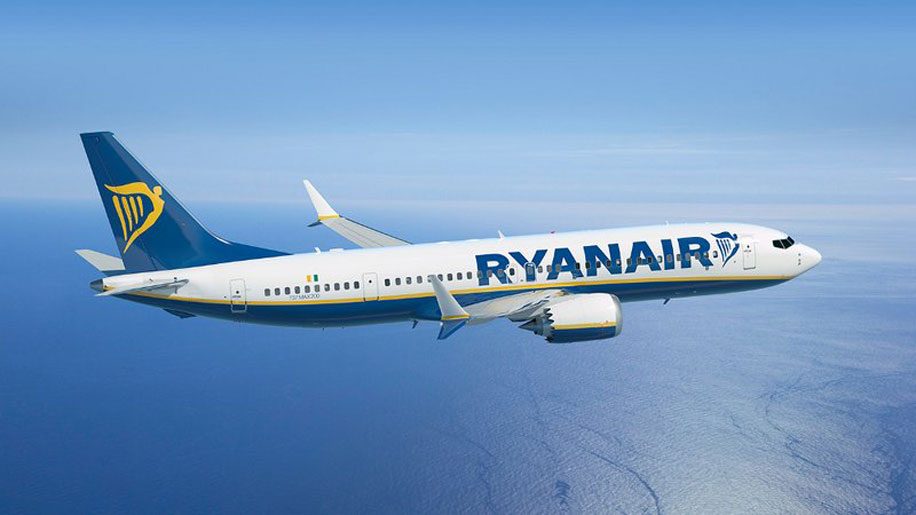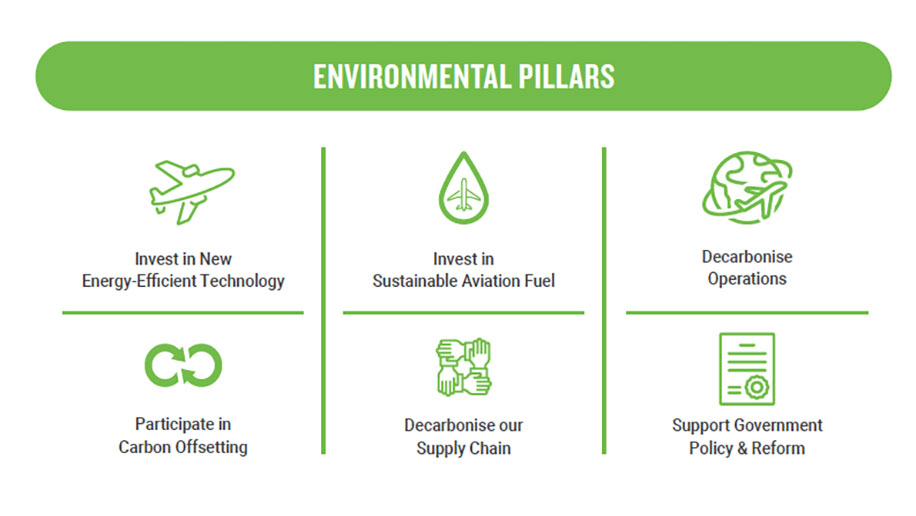
Ryanair says it is ‘the greenest and cleanest airline in Europe‘, but it also has huge growth ambitions.
It has a stated aim to become carbon neutral by 2050, and has laid out how in its ‘Decarbonisation Strategy – Pathway To Net Zero’.
Yet at the same time, it is also aiming to grow its annual traffic from 149 million passengers to 225 million passengers in the next five years. This means its emissions will go up, even as the emissions per passengers goes down.
It is already a very big airline, and with this comes a lot of emissions.
This report by Wired estimates that “Of the European Union’s ten biggest carbon dioxide (CO2) emitters, nine of them are coal-fired power plants. The tenth is Ryanair, the low-cost Irish airline which released 9.9 megatonnes of greenhouse gases in 2018 – a 6.9 per cent increase from 2017.”
In addition, the CEO of the Ryanair Group, Michael O’Leary, has been outspoken on the subject of climate change, and not in a positive way.
Even as recently as August 2002, when asked about the airline’s responsibility around carbon emissions as Europe suffered from wildfires he said (in an interview with the BBC Today programme)
“I always get nervous when we start linking short term weather patterns… with global warning or climate change. Climate has always changed.”
When challenged on this he said,
“The climate has always changed. There’s this myth about climate change that if we do something, what, climate will stop changing? In the Middle Ages the Thames used to freeze over in the winter. We go through periods of climate change. And by the way, I’m not expert enough to know if it’s linked to fossil fuel consumption or not, but I’m absolutely convinced that our fossil fuel consumption is going to dramatically decline in the next number of years because of our move towards electronic [sic] vehicles.”
O’Leary then moved onto the global picture.
“The bigger challenge is what are we going to do with the Chinese and the Indians and the Russians who are dramatically increasing their consumption of fossil fuels through coal fired power stations etc… So this misplaced focus on taxing air travel as the solution to fixing climate change when really it won’t move the dial a fraction, all it will do is make air travel, which is a vital service, certainly for the UK economy which is an island which depends on air travel not just for its tourism but for its economic welfare [more expensive]. It will not move the dial on climate change…. We’ve always had climate change.”
Here we look at how sustainable Ryanair is and its journey to net zero which stands on a number of strategic pillars.

1. Fleet
Ryanair says that 32 per cent of its decarbonisation will come through technological and operational improvements. The biggest technological improvement in the short term is upgrading its fleet to more modern aircraft, because the more modern the fleet used by an airline, the more fuel efficient it is.
Ryanair has one of the youngest and most fuel-efficient fleets in the world.
It calls its $22 billion investment in new aircraft including its Boeing B737 Max 200 aircraft of which it has ordered 210, its ‘Gamechanger’ fleet. These new aircraft are 16 per cent more fuel efficient, reduce noise emissions by 40 per cent and fit four per cent more seats on board.
One metric quoted by airlines is the grams of CO2 per passenger, and Ryanair’s aim here is 66g CO2 per pax/km in 2021 with an aim of 60g per passenger by 2030.

2. Sustainable Aviation Fuel
In its decarbonisation strategy, Ryanair estimates that 34 per cent of its decarbonisation will come through the increased use of sustainable aviation fuels (SAF). It has an interim goal of operating 12.5 per cent of its flights with SAF by 2030.
Ryanair is working with the EU and fuel suppliers to accelerate supply of SAF. As part of this, Ryanair established the Ryanair Sustainable Aviation Research Centre in partnership with Trinity College Dublin. This partnership will deliver research in SAF, Zero Carbon Aircraft Propulsion Systems and Noise Mapping.
It has also has partnered with SAF supplier Nestle Holland for its flights out of Amsterdam Schiphol. This will see a third of the airline’s flights out of the airport powered by a 40 per cent blend of SAF.
In addition, Ryanair has joined the Fuelling Flight initiative along with KLM, Easyjet, Air France and the airlines of the International Airlines Group including Aer Lingus, British Airways and Iberia.
The Fuelling Flight initiative was convened by the European Climate Foundation (ECF) and ClimateWorks Foundation (CWF) with technical advice provided by the International Council on Clean Transportation (ICCT).
The airlines – as well as research organisations and environmental groups – are calling for a more stringent policy approach to sustainability and the sector’s climate impact, as the European Union plans to unveil new targets for SAF in 2021. One of the principal concerns is the ‘food versus fuel’ problem, namely that the increased use of biofuels should not be at the cost of land that could be used for food. The aim is to exclude biofuels produced from dedicated cropland and instead prioritise fuels made from wastes and residues.
As the statement says
“Biofuel use in the EU has… been dominated by biofuels with high sustainability risks, including very questionable carbon savings compared to fossil fuels, whose inclusion has been facilitated by inadequate sustainability guarantees in the directives concerned.”
“A concrete example is the ongoing controversy over competition with other uses of land, such as production of food and feed for livestock or carbon sequestration by allowing reforestation.
“Putting this controversy to rest is crucial and can only be achieved by a regulatory framework which is transparent, future proof, and has a set of robust criteria for the sustainability and climate impacts of feedstocks and pathways. Future policy support should only go to fuels with high carbon reductions compared to fossil fuels, meaning amongst other things that they do not use dedicated cropland.”
Pete Harrison, executive director for EU Policy at the European Climate Foundation, said,
“Europe must ensure that future policies only promote the most sustainable fuels for reducing the climate impact of aviation, and the EU needs to avoid repeating the mistakes of the past.”
“The current Renewable Energy Directive does not ensure that fuels used in Europe meet the sustainability standards desired by civil society nor of leading airlines. In the Fueling Flight initiative, aviation companies, research organisations and environmental groups have now reached agreement on this important topic, and we propose shared guidelines on how to minimise environmental impacts.
“Policymakers should take this into consideration when defining a policy framework that is fair, affordable and meets the highest sustainability standards without compromise.”

3. Carbon offsetting
Ryanair sees 24 per cent of its decarbonisation through offsetting “and other economic measures”.
At present, Ryanair has a carbon calculator which allows customers to either partially offset their flight (for €2) or fully offset it. The calculator estimates the carbon emissions per passenger on every Ryanair route and will allow customers to pay the full carbon cost of their flight contributing to environmental initiatives.
The programmes supported are:
- Renature Monchique – a reforestation project in the Algarve
- The distribution of energy-efficient cookstoves in Uganda by First Climate;
- Balikesir’s Wind Power Plant Project in Turkey, and
- Improved Kitchen Regimes in Malawi powered by CO2 Balance (the latter two in partnership with Shell).
The final leg of Ryanair’s Pathway to Net Zero will come from a combination of offsetting measures, through carbon capture offset projects.
4. Air Traffic management
Ryanair sees 10 per cent of it decarbonisation coming through the introduction of better Air Traffic Management and the support of key government policies and reforms, such as the introduction of the Single European Sky ATM Research (SESAR) initiative.
The airline says that if successfully introduced by the European Commission, the SESAR would deliver a standardised and more efficient air traffic management process, delivering a significant and immediate 10 per cent reduction in European aviation carbon emissions.
So how sustainable is Ryanair?
From an efficiency point of view, it is hard to beat. Modern aircraft are more fuel efficient and emit less carbon dioxide. It also has plans to buy SAF, offset emissions and is looking to new technology to help it further reduce its emissions.
The problems comes with its growth plans. If that growth in passengers all came from taking passengers from other airlines and their older fleets, then Ryanair’s efficiencies would result in lower overall emissions, but as with other airlines, air traffic is predicted to recover to 2019 levels some time in 2023/4 and then continue to grow. Ryanair’s ambitious growth plans mean its journey to net zero is likely to be bumpy.









![Etihad B787 Greenliner[1] The B787 is now the backbone of the Etihad Airways fleet. By 2023, this aircraft will represent over 50% of the airline’s fleet.](https://cdn.businesstraveller.com/wp-content/uploads/fly-images/1203790/Etihad-Greenliner1-360x203.jpg)


